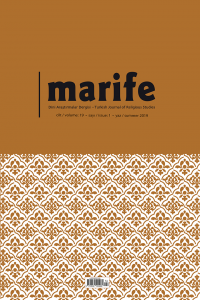
Marife Dini Araştırmalar Dergisi
Yazarlar: Selçuk PEKPARLATIR
Konular:Edebiyat
DOI:10.33420/marife.770590
Anahtar Kelimeler:Arabic Language,Al-Tayeb Sâlih,Modern Arabic Literature,Short Story,Modern Sudanese Literature
Özet: The modernization movement in Arabic literature, which is considered to have started with Napoleon's invasion of Egypt, first showed itself in centers of science and civilization such as Egypt and Damascus. The effect of this modernization movement, which was seen in other Arab countries over time, was first seen in prose and then this effect was also reflected in poetry. Sudan is one of the countries affected by the modernization movement. Especially in Sudan, which was greatly affected by the developments in Egypt, this process took place later than other countries where modernization was observed. There are a number of reasons for the delay in the development of literature in Sudan. These can be listed as follows: First of all, Sudan gained its independence in 1956, after it was freed from being a British colony. In addition, the political and economic instability in the country caused limited press, broadcasting and printing facilities and caused the literacy rate of the public to be low. These impossibilities do not mean that there are no literary activities in the country or that there is no literary education, but they have caused Sudan to lag behind the developments in other states and the Sudanese literary figures to not be heard much. In addition to these, internal factors such as the coexistence of Islam, Christianity and local religions, Arabic, Sudanese dialect and many local languages also negatively affected the development of literature in Sudan. In Sudan, it is possible to divide the development stages of the short story into three chronologically. These periods are named as the initial period between 1930 and 1945, the maturation and transition period between 1945 and 1956, and the modern period from 1956 to the present. Changes in Sudanese society brought about a change in the subjects dealt with in literary works. Parallel to the chronological distinction, it is possible to consider the change experienced by the short story in Sudan in three stages. First of all, there was a period when fictional romance prevailed in Sudanese storytelling. In the second period, works containing discourses on the problems of society and life were given. In the third period, socialist realistic works were written that deal with social life, stories of struggle, and the search for solving the vital problems faced by the individual and society. As can be seen, in the modern period starting from the independence of Sudan and continuing until today, Sudan has been under the influence of the changes and developments in the field of literature in Arab countries, especially Egypt. During this period, Sudanese literature made significant breakthroughs in poetry and prose and managed to attract attention. In this sense, al-Tayeb Salih has played an important role in the development of Sudanese literature and in making its name known, and his works have received worldwide attention. The author, who has the view that art is for art and believes in talent in art, did not adhere to a certain style in his works, and conveyed his fictions to the reader using a symbolic or realistic method. In general terms, the fact that Sudan is a country struggling with poverty and struggling with political instability has delayed its adaptation to the era in the field of literature as in every field, and caused it to be difficult to make its voice heard in Modern Arabic Literature. In the modern literature of Sudan, which made a breakthrough after the 60's, al-Tayeb Salih became Sudan's gateway to the world. The fact that he has lived abroad since his youth is one of the biggest factors in this. Although he lived abroad for a long time, a pure western imitation is not seen in the works of al-Tayeb Salih. The writer, who often mentions his village where he spent his childhood in his works, has not lost his roots in this sense. However, his longing for his village and his childhood did not prompt him to consider life in Sudan from a romantic point of view. The author has succeeded in reading the events of his life with universal values and reflecting this in his works. The fact that the author, who synthesizes the West and the East in a good way, is abroad in this context has made positive contributions to the literature. In his story, Hafnetu Temr, which was examined, the author told readers about the events in a village in Sudan from a child's point of view. However, he reflected a child's reactions to events, emotional turbulence and attitude in an impressive manner, thus conveying his own feelings and thoughts to the reader through him. In addition to a simple and fluent language that is usually made up of short sentences in his story, which has an uncomplicated plot; the author, who successfully uses narrative methods such as narration, dialogue, description, and inner monologue, has added a more aesthetic dimension to his already impressive expression with nice analogies.